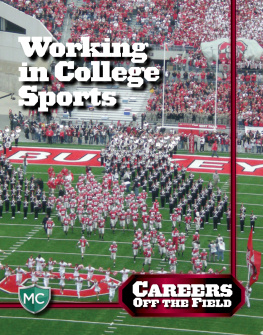As shown by the wonderful stories in Count on Me: Sports, athletics can not only reveal character, but also inspire it.
Shannon Miller, two-time Olympic gold medalist in gymnastics
The true tales in Brad Herzogs books show how the games we play can teach seriously important life lessons.
Jake Delhomme, former Super Bowl quarterback for the Carolina Panthers

Copyright 2014 by Brad Herzog
All rights reserved under International and Pan-American Copyright Conventions. Unless otherwise noted, no part of this book may be reproduced, stored in a retrieval system, or transmitted in any form or by any means, electronic, mechanical, photocopying, or otherwise, without express written permission of the publisher, except for brief quotations or critical reviews. For more information, go to www.freespirit.com/company/permissions.cfm.
Free Spirit, Free Spirit Publishing, and associated logos are trademarks and/or registered trademarks of Free Spirit Publishing Inc. A complete listing of our logos and trademarks is available at www.freespirit.com.
Library of Congress Cataloging-in-Publication Data
Herzog, Brad.
Inspiring stories of sportsmanship / Brad Herzog.
pages cm. (Count on me: sports)
Includes index.
Summary: Teaches kids about positive character and sportsmanship through real-life examples.
ISBN-13: 978-1-57542-455-2 (pbk.)
ISBN-10: 1-57542-455-X
1. SportsmanshipJuvenile literature. I. Title.
GV706.3.H47 2014
175dc23
eBook ISBN: 978-1-57542-600-6
Free Spirit Publishing does not have control over or assume responsibility for author or third-party websites and their content.
Reading Level Grade 5; Interest Level Ages 813;
Fountas & Pinnell Guided Reading Level T
Edited by Alison Behnke
Cover and interior design by Michelle Lee Lagerroos
Cover photo credits: background Bruxov|Dreamstime.com; clockwise from top left:
AP Photo/David J. Phillip; AP Photo/Blake Wolf; AP Photo/Paul Sancya;
Press Association via AP Images; AP Photo/Frank Gunn/CP; AP Photo/Alastair Grant.
For interior photo credits, see .
Free Spirit Publishing Inc.
Minneapolis, MN
(612) 338-2068
www.freespirit.com
Free Spirit offers competitive pricing.
Contact for pricing information on multiple quantity purchases.
DEDICATION
In memory of Court Erickson, who never lost his youthful enthusiasm, his love of sports, or his generosity of spirit.
ACKNOWLEDGMENTS
Thank you to Judy Galbraith, Margie Lisovskis, and the rest of the crew at Free Spirit Publishing for having the courage to pursue a series of books celebrating stories of character in sports. I found Alison Behnke to be both insightful and inclusive as an editor, an authors dream combination, and Michelle Lee Lagerroos put in overtime making sure the designs were just right. Finally, I am grateful to Aimee Jackson for bringing me to Free Spirit in the first place and for her unwavering support and friendship.
CONTENTS
When a player on the opposing team is injured, a softball player has a bold idea.
A world-class runner makes a split-second decision about sportsmanship during an important race.
One enormous storm brings two sailors together in a life-saving situation.
A runners act of goodwill near the finish line is the start of a friendship.
After an umpires momentous mistake, a pitcher throws him a curveball: Forgiveness.
An undefeated football team decides that winning isnt everything.
Two Olympians who could have been enemies show the world an example of kindness instead.
An Olympic fencer sacrifices a historic win for the sake of honesty.
An English soccer team reveals that the most important goal is sportsmanship.
One of the worlds best golfers decides that a personal victory isnt the ultimate prize.
When an Olympic skier loses the use of a pole, a mystery man lends a hand.
A group of high school runners shows that integrity has more value than a medal.
A British racing legend comes to the defense of his rival.
One basketball players tragedy inspires a triumphant act by the other team.
A professional hockey player makes a point by refusing sole credit for a goal.
When poor sportsmanship interrupts an Olympic marathon, good sportsmen respond.
A cross-country runner lifts spirits by helping an injured opponent.
A 20-year-old weighs her Olympic dreams against those of her best friend.
A high school quarterback decides that records are made to be brokenthe right way.
Everyone believes that a tennis match is over. Everyone except the man who supposedly won it.
INTRODUCTION
Sportsmanship takes many different forms. That can make it tough to define. Sportsmanship can mean winning fairly, competing with integrity, or losing with dignity. It can mean showing humility or honesty, or sticking to your values even during fierce competition. Someone might show sportsmanship by helping a fallen opponent, or by sacrificing to help someone else. It can take place on the field, in the stands, or far from the action. It can be demonstrated by players, coaches, referees, or fans. It can happen during a game or before a match or even long afterward. Whatever form it takes, we know true sportsmanship when we see it.
The author Mark Twain had his own humorous thoughts on the idea. Its good sportsmanship, he once noted, to not pick up lost golf balls while they are still rolling. Of course, most of us prefer to aim a bit higher than that. Bobby Jones certainly did.
Many people view Bobby Jones as the best amateur golfer in history. He was a seven-time major golf champion. And he was nearly as well known for being a sportsman as he was for being a champ. During the 1925 U.S. Open, Jones hit a poor shot. His ball landed in the rough (the taller grass next to the main fairway). As he was getting ready to take his next shot,
his club bumped the ball, moving it slightly. Thats against the rules. But nobody had seen it happen. Not the course marshals, who had the job of applying those rules. Not the fans standing nearby. Nobody but Bobby Jones.
Jones told the marshals about his mistake. Because no one else actually saw it happen, the officials said that Jones could decide what to do. He didnt hesitate. He called a two-stroke penalty against himself. He later lost the tournamentby a single stroke. Today, the United States Golf Associations sportsmanship honor is named the Bob Jones Award. But after the tournament, when people praised Jones for his gesture, he just shrugged his shoulders and replied, You may as well praise a man for not robbing a bank.
What Jones was saying was: Why expect anything less? Shouldnt good sportsmanship be the rule, not the exception?
Yet great acts of sportsmanship can inspire us all. At about the same time Bobby Jones was dominating the golf world, a man by the name of Knute Rockne was dominating college football. Rockne coached the University of Notre Dame team, and he led them to five undefeated seasons. Rockne once said, One man practicing good sportsmanship is far better than 50 others preaching it.
This book is full of stories of people practicing good sportsmanship. It features athletes and coaches in everything from football and fencing to soccer, sailing, tennis, and tae kwon do. This is a book about winnerseven when they didnt win.

















